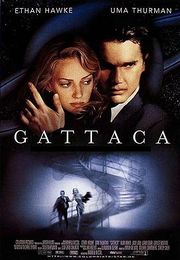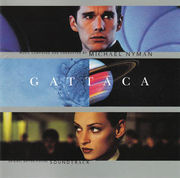Gattaca
| Gattaca | |
|---|---|
 Theatrical release poster |
|
| Directed by | Andrew Niccol |
| Produced by | Danny DeVito |
| Written by | Andrew Niccol |
| Starring | Ethan Hawke Uma Thurman Jude Law Gore Vidal Loren Dean |
| Music by | Michael Nyman |
| Cinematography | Slawomir Idziak |
| Editing by | Lisa Zeno Churgin |
| Distributed by | Columbia Pictures |
| Release date(s) | October 24, 1997 |
| Running time | 106 minutes |
| Country | United States |
| Language | English |
| Budget | $36 million |
| Gross revenue | $12,532,777 (North America) |
Gattaca is a 1997 American science fiction film written and directed by Andrew Niccol. It stars Ethan Hawke, Uma Thurman and Jude Law with supporting roles played by Loren Dean, Ernest Borgnine, Gore Vidal and Alan Arkin.[1] The film was a 1997 nominee for the Academy Award for Best Art Direction — Set Decoration.
The film presents a vision of a society driven by liberal eugenics where potential children are selected through preimplantation genetic diagnosis to ensure they possess the best hereditary traits of their parents. A genetic registry database uses biometrics to instantly identify and classify those so created as "valids" while those conceived by traditional means are derisively known as "in-valids". While genetic discrimination is forbidden by law, in practice it is easy to profile a person's genotype resulting in the Valids qualifying for professional employment while the In-Valids (who are considered to be more susceptible to physical and intellectual and psychological dysfunction and under-performance) are relegated to menial jobs. The movie draws on concerns over reproductive technologies which facilitate eugenics, and the possible consequences of such technological developments for society. It also explores the idea of human spirit and the ways in which it can and does govern lives. Characters in Gattaca continually battle both with the society and with themselves to find their place in the world and who they are destined to be according to their genes.
The title is based on the initial letters of the four DNA nitrogenous bases (adenine, cytosine, guanine, and thymine). During the credits the letters G, C, T, and A are all highlighted.
Contents |
Plot
In “the not-so-distant future”, liberal eugenics is common and DNA plays the primary role in determining social class. Vincent Freeman (Ethan Hawke) is conceived and born without the aid of this technology. He has a high probability of mental illness, heart disorder and a life expectancy of 30.2 years. His parents initially placed their faith in natural birth and now regret it; Vincent's younger brother, Anton, is conceived with the aid of genetic selection. Anton surpasses his older brother in many aspects including a game that they call "chicken" — both swim out into the sea, and the first to give up and swim back to shore is the loser. Anton always wins due to his superior physical stamina. Vincent dreams of a career in space, but is constantly reminded of his genetic inferiority. One day when the two brothers are older, Vincent decides to leave the house, and for the last time challenges Anton with a game of chicken. For an unknown reason, Vincent swims farther out than his brother, while Anton runs into trouble and begins to drown. Vincent saves him, then leaves home shortly thereafter.
Due to frequent screening, Vincent faces genetic discrimination and prejudice. The only way he can achieve his dream of becoming an astronaut is to become a "borrowed ladder", a person who impersonates a "valid" with appropriate genetic profile.[2] He assumes the identity of Jerome Eugene Morrow (Jude Law), a former swimming star with a genetic profile "second to none", who had an accident that left him paralyzed from the waist down. Vincent "buys" Jerome's identity and uses his "valid" DNA in blood, hair, tissue and urine samples to pass screening. In order for his status to remain hidden, he has to be meticulous about cleaning up his genetic material and replacing it with Jerome's. With Jerome's genetic profile Vincent gains access to the Gattaca Aerospace Corporation, the most prestigious space-flight conglomerate. He becomes Gattaca's top celestial navigator and is selected for a manned spaceflight to Saturn's moon Titan. A week before Vincent is to leave on the one-year mission, one of Gattaca's managing directors is found murdered in his office. Police discover evidence of Vincent's own "in-valid" DNA, making him the prime suspect.
Vincent must evade increasing security measures as his launch date approaches. Simultaneously, he becomes close to both Jerome and one of his co-workers, Irene Cassini (Uma Thurman). These valids also suffer from the genetic hierarchy of the society. Irene is resigned to her less favorable treatment within Gattaca due to her less perfect profile; her initial attraction to Vincent is largely due to his perceived "second to none" superiority. Jerome suffers from the burden of his genetic perfection. When he won only a silver medal in a high-profile competition, it was seen by his peers as a failure due to his genetic advantage. While intoxicated, Jerome confesses that he did not have a car accident. Rather, he attempted suicide by jumping in front of a car, but only paralyzed himself from the waist down.
After numerous close calls, Vincent's identity is revealed to Irene. Irene finally sees Vincent for who he is and they fall in love. The investigation unexpectedly comes to a close as Director Josef (Gore Vidal) is arrested for the murder. The Director reveals that he murdered the mission director because the victim was trying to cancel the Titan mission. As Vincent appears to be in the clear he is confronted by the youthful chief detective, who is revealed to be Vincent's estranged younger brother, Anton (Loren Dean). Anton accuses Vincent of fraud and asserts that Vincent is unworthy of his place at Gattaca. Vincent offers to prove his worthiness by challenging Anton to chicken. As he did before, Vincent beats Anton who once again must be rescued by his brother. When Anton asks him how he did it, Vincent reveals that he never saved any strength for the swim back.
As the day of the launch arrives, Jerome bids Vincent farewell. He reveals that he has stored enough genetic samples to last Vincent two lifetimes. Overwhelmed and grateful, Vincent thanks Jerome, but Jerome replies that it is he who should be grateful, since Vincent lent Jerome his dreams. Jerome gives Vincent a card but asks him not to open it until he reaches space.
As Vincent moves through the Gattaca complex to the launch site, he is stopped for an unexpected last urine test. Vincent has not brought Jerome's urine to hide his identity as he assumed there would not be any more tests once inside Gattaca. The test result uncovers Vincent's identity, but Lamar, the doctor conducting the test (and who also conducted Vincent's initial interview at Gattaca) reveals he has known Vincent's identity for some time. Lamar reminds Vincent that he has wanted to tell Vincent about his son -- his son admires Vincent and wants to be an astronaut despite a genetic defect that would rule him out. Lamar switches the test result, allowing Vincent to proceed.
The shuttle lifts off with Vincent, and he opens the card from Jerome to find no words -- just a hair sample, reflecting all DNA can express, and cannot. On Earth, Jerome climbs inside his home incinerator, puts on his silver medal and fires up the flames, killing himself as Vincent's shuttle flight lifts off. Vincent says via voiceover that he is suddenly sad to leave Earth, despite having wished to reach space for so long.
Cast
- Ethan Hawke as Vincent Freeman
- Uma Thurman as Irene Cassini
- Jude Law as Jerome Eugene Morrow
- Gore Vidal as Director Josef
- Loren Dean as Anton Freeman
- Xander Berkeley as Dr. Lamar
- Jayne Brook as Marie Freeman
- Elias Koteas as Antonio Freeman
- Maya Rudolph as delivery nurse
- Blair Underwood as geneticist
- Ernest Borgnine as head janitor "Caesar"
- Tony Shalhoub as personality trader "German"
- Alan Arkin as Detective Hugo
Production
Development
Filming

The exteriors (including the roof scene), and some of the interior shots, of the Gattaca complex were filmed at Frank Lloyd Wright's 1960 Marin County Civic Center in San Rafael, California.[3]
The exterior of Vincent Freeman's house was shot at the CLA Building on the campus of California State Polytechnic University, Pomona (Cal Poly Pomona).
Design
The film borrows many design and thematic ideas from the film noir genre,[4] making the film a notable example of tech noir. The movie uses a swimming treadmill by Endless Pools in the opening minutes to punctuate the swimming and futuristic themes.[5] The futuristic turbine cars are based on 1960s car models like Rover P6, Citroën DS19 and Studebaker Avanti,[6] and futuristic buildings represent modern architecture of the 1950s.
Release
Theatrical
Gattaca was released in theaters on October 24, 1997, and opened at number 5 at the box office; trailing I Know What You Did Last Summer, The Devil's Advocate, Kiss the Girls, and Seven Years in Tibet.[7] Over the first weekend the film brought in $4.3 million. It ended its theatrical run with a domestic total of $12.5 million against a reported production budget of $36 million.[8]
Home media
Gattaca was released on DVD on July 1, 1998. Special Edition DVD and Blu-ray versions were released on March 11, 2008. Both editions contain a deleted scene featuring historical figures like Einstein, Lincoln, etc., who are genetically deficient.[8]
Critical reception
The film received a "fresh" rating from Rotten Tomatoes with 82% of the 55 critics cited giving the film a favorable review. The average rating for the film was 7.1/10.[9] On Metacritic the film received "generally favorable reviews" with a score of 67 out of a possible 100.[10] Roger Ebert stated, "This is one of the smartest and most provocative of science fiction films, a thriller with ideas."[11] James Berardinelli praised it for "energy and tautness" and its "thought-provoking script and thematic richness."[12]
Despite critical acclaim, Gattaca was not a box office success but it is said to have crystallized the debate over tampering with human genetics.[13][14][15] The film's dystopian depiction of "genoism" has been cited by many bioethicists and laymen in support of their hesitancy about, or opposition to, liberal eugenics and the societal acceptance of the genetic-determinist ideology that may frame it.[16] In a 1997 review of the film for the journal Nature Genetics, molecular biologist Lee M. Silver stated that "Gattaca is a film that all geneticists should see if for no other reason than to understand the perception of our trade held by so many of the public-at-large".[17]
In 2004, bioethicist James Hughes criticized the premise and influence of the film Gattaca, arguing that:[18]
- Astronaut-training programs are entirely justified in attempting to screen out people with heart problems for safety reasons;
- In the United States, people are already discriminated against by insurance companies on the basis of their propensities to disease despite the fact that genetic enhancement is not yet available;
- Rather than banning genetic testing or genetic enhancement, society needs genetic information privacy laws that allow justified forms of genetic testing and data aggregation, but forbid those that are judged to result in genetic discrimination (such as the U.S. Genetic Information Nondiscrimination Act signed into law on May 21, 2008.). Citizens should then be able to make a complaint to the appropriate authority if they believe they have been discriminated against because of their genotype.
Soundtrack
| Gattaca | ||||
|---|---|---|---|---|
 |
||||
| Soundtrack by Michael Nyman | ||||
| Released | October 21, 1997 | |||
| Genre | Contemporary classical music, film scores, minimalism | |||
| Length | 54:55 | |||
| Label | Virgin Records America | |||
| Producer | Michael Nyman | |||
| Professional reviews | ||||
| Michael Nyman chronology | ||||
|
||||
The score for Gattaca was composed by Michael Nyman, and the original soundtrack was released on October 21, 1997.[19]
Track listing
- "The Morrow" – 3:13
- "God's Hands" – 1:42
- "The One Moment" – 1:40
- "Traces" – 1:00
- "The Arrival" – 3:53
- "Becoming Jerome" – 1:06
- "Call Me Eugene" – 1:24
- "A Borrowed Ladder" – 1:47
- "Further and Further" – 2:43
- "Not the Only One" – 2:14
- "Second Morrow" – 2:24
- "Impromptu for 12 Fingers" – 2:55 (from Franz Schubert's "Impromptu in G-flat Major, Op. 90, No. 3")
- "The Crossing" – 1:24
- "It Must Be the Light" – 1:23
- "Only a Matter of Time" – 1:07
- "I Thought You Wanted to Dance" – 1:13
- "Irene's Theme" – 1:09
- "Yourself for the Day" – 2:20
- "Up Stairs" – 2:02
- "Now That You're Here" – 2:44
- "The Truth" – 2:13
- "The Other Side" – 3:44
- "The Departure" – 3:51
- "Irene & the Morrow" – 5:44
Television series
On October 30, 2009, Variety reported that Sony Pictures was developing a television adaptation of the feature film as a one-hour police procedural set in the future. The show will be written by Gil Grant, who has written for 24 and NCIS.[21]
References
- ↑ "Gattaca - 1997 - Ethan Hawke, Andrew Niccol - Variety Profiles". Variety. http://www.variety.com/profiles/Film/main/27000/Gattaca.html?dataSet=1. Retrieved 2008-06-01.
- ↑ "Gattaca — Movie Review". Metro times. http://www.metrotimes.com/editorial/review.asp?id=51785. Retrieved 2008-06-01.
- ↑ "Gattaca a Not-So-Perfect Specimen", Mick LaSalle, San Francisco Chronicle, Friday, October 24, 1997, URL retrieved 19th February 2009
- ↑ "Review of Gattaca". Challengingdestiny.com. 2004-02-25. http://www.challengingdestiny.com/reviews/gattaca.htm. Retrieved 2009-10-10.
- ↑ "Gattaca:the Hollywood debut of the Endless Pool". Endlesspools.com. 2009-07-30. http://www.endlesspools.com/whatis/gattaca.html. Retrieved 2009-10-10.
- ↑ ""Gattaca, 1997": cars, bikes, trucks and other vehicles". IMCDb.org. http://www.imcdb.org/movie_119177-Gattaca.html. Retrieved 2009-10-10.
- ↑ "US Movie Box Office Chart Weekend of October 24, 1997". The Numbers. 1997-10-24. http://www.the-numbers.com/charts/weekly/1997/19971024.php. Retrieved 2009-10-10.
- ↑ 8.0 8.1 "Movie Gattaca - Box Office Data, News, Cast Information". The Numbers. http://www.the-numbers.com/movies/1997/GATTA.php. Retrieved 2009-10-10.
- ↑ "Gattaca (1997)". Rotten Tomatoes. http://www.rottentomatoes.com/m/gattaca/. Retrieved 2009-08-01.
- ↑ "Gattaca reviews at". Metacritic.com. http://www.metacritic.com/video/titles/gattaca. Retrieved 2009-10-10.
- ↑ "Gattaca :: rogerebert.com :: Reviews". Rogerebert.suntimes.com. 1997-10-24. http://rogerebert.suntimes.com/apps/pbcs.dll/article?AID=/19971024/REVIEWS/710240303/1023. Retrieved 2009-10-10.
- ↑ "Review: Gattaca". Reelviews.net. http://reelviews.net/movies/g/gattaca.html. Retrieved 2009-10-10.
- ↑ Brown, Evan (2007). Gattaca Now! The sequel to the 10-year-old classic science fiction film is in real-life science labs. http://www.newhavenadvocate.com/article.cfm?aid=3943. Retrieved 2008-08-02.
- ↑ Darnovsky, Marcy (2008). Are We Headed for a Sci-Fi Dystopia?. http://www.alternet.org/story/80151/. Retrieved 2008-03-23.
- ↑ Pope, Marcia; McRoberts, Richard (2003). Cambridge Wizard Student Guide Gattaca. Cambridge University press. ISBN 0-521-53615-4.
- ↑ Kirby, D.A. (2000). The New Eugenics in Cinema: Genetic Determinism and Gene Therapy in GATTACA. Science Fiction Studies, 27: 193-215.. http://www.depauw.edu/sfs/essays/gattaca.htm. Retrieved 2008-01-08.
- ↑ Silver, Lee M. (1997). Genetics Goes to Hollywood. http://www.nature.com/ng/journal/v17/n3/pdf/ng1197-260.pdf. Retrieved 2008-01-08.
- ↑ Hughes, James (2004). Citizen Cyborg: Why Democratic Societies Must Respond to the Redesigned Human of the Future. Westview Press. ISBN 0-8133-4198-1.
- ↑ "Gattaca soundtrack overview". Allmusic. http://www.allmusic.com/cg/amg.dll?p=amg&sql=10:a9fuxqyjld0e. Retrieved 2008-10-30.
- ↑ "Gattaca soundtrack". SoundtrackNet, LLC. http://soundtrack.name/albums/database/?id=968. Retrieved 2008-09-06.
- ↑ Schneider, Michael (2009-10-29). "Apostle preps for post-'Rescue' life". www.variety.com. http://www.variety.com/article/VR1118010604.html?categoryid=14&cs=1&nid=2562. Retrieved 2009-10-31.
External links
- Official website
- Gattaca at the Internet Movie Database
- Gattaca at Allmovie
- Gattaca at Metacritic
- Gattaca at Box Office Mojo
- Gattaca at Rotten Tomatoes
- Gattaca Screenplay
- Genetic Determinism in Gattaca
|
|||||